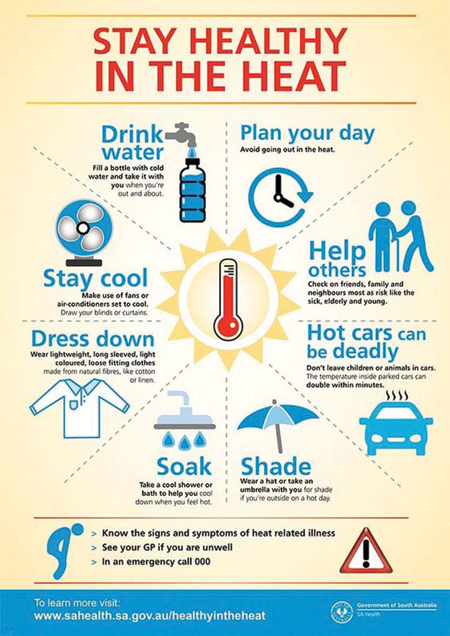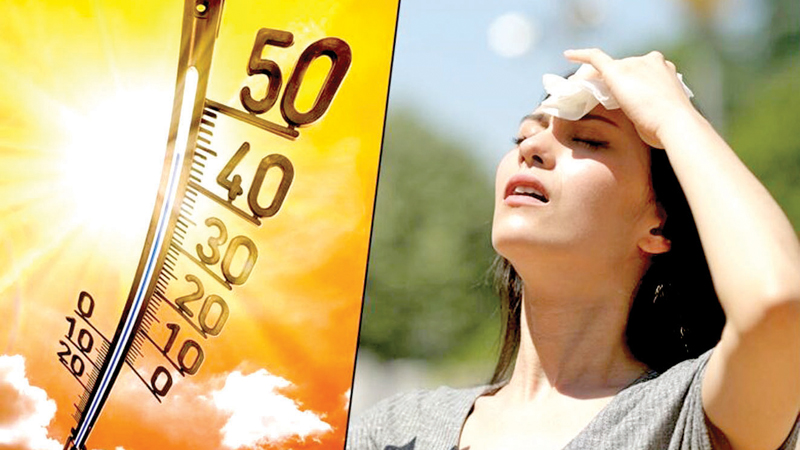 Soaring temperatures both globally and in Sri Lanka have raised alarm bells as the number of cases of respiratory problems, skin diseases, sun stroke and other heat related problems keep mounting especially in vulnerable persons such as the elderly and young. prompting health officials to warn the public on taking immediate steps to protect themselves. The Sunday Observer spoke to the Senior Registrar. National Chest Hospital Welisara Dr. Chanurdi Wickramathunga to find out how these adverse impacts could be reduced and symptoms to look out for in those with signs of being affected by the heat.
Soaring temperatures both globally and in Sri Lanka have raised alarm bells as the number of cases of respiratory problems, skin diseases, sun stroke and other heat related problems keep mounting especially in vulnerable persons such as the elderly and young. prompting health officials to warn the public on taking immediate steps to protect themselves. The Sunday Observer spoke to the Senior Registrar. National Chest Hospital Welisara Dr. Chanurdi Wickramathunga to find out how these adverse impacts could be reduced and symptoms to look out for in those with signs of being affected by the heat.
Excerpts.
Q: Currently the world is in the grip of a heat wave which has impacted several millions of people globally and in Sri Lanka. What factors have contributed to this?
A. Heat waves are caused by a complex interaction of a multitude of conditions. These include High-pressure Systems, Land Use Changes and Urban Heat Island Effect, Ocean currents, and human-induced Climate-Change. High-pressure systems are also known as anti cyclones, and are the result of air descending, compressing and trapping heat like a lid and preventing cloud-formation.

Dr. Chanurdi Wickramathunga
Land use changes such as deforestation and loss of water bodies disrupt rain-cycles and the concrete and tar of cities that replace them traps more heat, in what is known as the Urban Island Effect. Ocean current disruptions cause changes in temperatures on the sea surface as well as the adjacent land. As noted, climate change and human-activity generated greenhouse gasses that trap heat are responsible for increasing the frequency and prolonging the effects of heatwaves.
Q: How does Sri Lanka compare with the rest of the countries in the region and in western countries where fatalities have occurred due to the current heat wave ?
A. With regard to Sri Lanka, a WHO study in 2015 estimated that Sri Lanka’s heat-related mortality would increase by five-fold by 2030, from a baseline of 1990. But these numbers may still underestimate the effects of extreme heat on health, as they don’t capture the indirect impacts on heat waves such as the degradation of air quality, loss of nutrition and rise of zoonotic infections.
Q: What are the main physical impacts of high temperatures on one’s body? Dehydration? Strokes? Heart and kidney failure?
A. Extreme temperatures can have devastating effects on the human body. Such impacts include heat stroke, hyperthermia, dehydration, skin rashes, heat strokes and damages to vitals such as heart and kidney. Extreme heat causes excessive sweating and fluid loss.
This in turn causes electrolyte imbalances which result in muscle cramps and exhaustion. With fluid depletion, kidney efficiency drops and places a strain on their operations. Blood thickening due to dehydration causes cardiac stress, impairing heart functions. Therefore, exposure to high temperatures may debilitate the human body
Q: How does excessive heat affect adults ?
A. Heat can cause psychological stress and cognitive impairment in adults, while there are some research findings to suggest that it may affect child development.
Psychological health issues such as irritability and aggression, anxiety and depression, substance abuse, and suicide are driven by the effects of high temperatures on activities of neurotransmitters such as serotonin that regulate mood. Compounding these, heat disrupts sleep, affecting our focus and decision-making. The effects on heat for child development is ongoing, but studies have found that primary-school children in heated classrooms show poor cognitive abilities. Consequently, extreme heat damages mental wellbeing in addition to posing the physical hazards I discussed earlier.
Q: Are those with pre-existing conditions like diabetes, hypertension , cholesterol more vulnerable to heat impacts? Age wise and gender wise who are those most at risk of overheating of the body? Why?
A. Pre-existing conditions that weaken circulation such as Diabetes, Hypertension and Elevated Cholesterol also affect our susceptibility to heat strokes and exhaustion. So, while your age and health are certainly important considerations in assessing your heat-exposure risk, all of us need to take necessary precautions to alleviate the afflictions of high temperature.
 Depending on its duration and intensity, exposure to heat can affect everyone. However, certain groups are more at risk. Infants and young children up to 5 years, and older adults over 65 are susceptible due to their impaired temperature regulation. The effect on gender is still being researched. Pre-existing conditions that weaken circulation such as Diabetes, Hypertension and Elevated Cholesterol also affect our susceptibility to heat strokes and exhaustion. So, while your age and health are certainly important considerations in assessing your heat-exposure risk, all of us need to take necessary precautions to alleviate the afflictions of high temperature.
Depending on its duration and intensity, exposure to heat can affect everyone. However, certain groups are more at risk. Infants and young children up to 5 years, and older adults over 65 are susceptible due to their impaired temperature regulation. The effect on gender is still being researched. Pre-existing conditions that weaken circulation such as Diabetes, Hypertension and Elevated Cholesterol also affect our susceptibility to heat strokes and exhaustion. So, while your age and health are certainly important considerations in assessing your heat-exposure risk, all of us need to take necessary precautions to alleviate the afflictions of high temperature.
Q: It has been said that women who are pregnant and those in the menopausal stage are more vulnerable. Is this true?
A. Women can be especially vulnerable if they are expectant or menopausal. Pregnancy places an additional burden on a woman’s body, with increased blood volume and metabolic rate, making temperature regulation and circulation more difficult. During menopause, sweating issues and hot flashes cause discomfort to women. So extra precautions may be necessary if you are in these stages of life.
Q: What about those who are obese? And those who smoke and drink alcohol- do they have higher risks ?
A. As with many things, one’s heat-susceptibility is also affected by obesity and lifestyle. Obese people have a higher body mass, and often need to strain their temperature regulation systems past extra body fat insulation. In terms of lifestyles, smoking reduces lung functions and damages blood vessels, impairing respiration, and circulation, two key processes in our thermo-regulation. Alcohol consumption has a direct diuretic effect that stimulates dehydration.
Q: Those who smoke and drink alcohol? Do they have higher risks
A. If coupled with judgement-impairment, immoderate alcohol consumption can result in risky behaviour – a disorder that may also be prevalent in heat-affected individuals. Therefore food moderation and healthy lifestyle choices can help you better withstand heat exposure.
Q: Which occupations are most vulnerable to heat exposure?
A. Heat exposure is an occupational hazard for many occupations including the military, the police, firefighters and first respondents, construction workers, farmers and agricultural workers, roofers and athletes. Road construction workers have to deal with heating tar as well. Employees must be well-protected and adequate hydration, shading and breaks must be provided. It is important to protect new employees especially, as they may not be accustomed to heat .
Q: Will in-door plants, fans, Air-conditioning help to make it more heat tolerant?
A. Ensuring proper ventilation and cross-ventilation along with proper shading can help reduce temperatures. Indoor plants can reduce temperatures through transpiration, but this also results in increased humidity, so it should be balanced with ensuring proper ventilation. Regular baths when at home can also provide much needed relief. It is also important to adjust daily routines to limit strenuous and heat-generating activities during peak heat times. In terms of cooling, air conditioning is more effective than fans as fans circulate air rather than actually lowering temperature.
Q: Are there ways we can reduce our body heat naturally?
A. There are several recommendations for this. The most crucial advice is to drink plenty of fluids and hydrate yourself. Cool showers and baths may also help. Wearing light colored clothing that is loose-fitting and made of natural fabrics like cotton or linen is recommended. Staying under a shade or indoors is also helpful, especially if the area is well ventilated.
Q: Does sweating help? Some people do a lot of exercise to sit out and get rid of the heat in their bodies. Your comments.
A. You must be careful not to sweat. Sweating is one of the body’s main methods to tackle temperature, as body heat is expended when sweat evaporates. However, the sweating process also consumes water, salt and electrolytes which may cause muscle cramps and dehydration. Therefore, sweat-inducing exertions are best avoided during high temperatures. And it is paramount that sweating is coupled with effective hydration.
Q: With reference to hydration, what tips do you have to do this through drink and food intake?
A. Hydration requires a conscious effort, given the crucial role that it plays in heat mitigation. It is recommended to start the day hydrated, and set a reminder to hydrate oneself at least once an hour, while more frequent drinking may be needed if one feels unwell, exhausted or faintish. For symptoms such as heat cramps, The Ministry of Health recommends at least half-a-glass every 15 minutes. Hydration can also be supplemented with water-rich foods.
Q: Food wise – are there foods that help reduce adverse impacts of heat?
A. Food is an important regulation mechanism. Water-rich food is such as water-melons, berries, tomatoes, cucumber, celery and citrus and electrolyte-rich natural drinks such as king coconut.
Potassium is also lost in sweat and leafy greens, bananas and avocados can help replenish this electrolyte. Limit alcohol, sugar and caffeine intake. Spicy diets will cause you to sweat more, and therefore should be consumed with caution. Sugary drinks can fluctuate blood sugar, and arouse a feeling of exhaustion and thirst after the initial sugar-rush wanes. Fried food can add calories that may generate internal heat. Larger meals are harder to digest and cause more exhaustion. Therefore mindful eating is important to manage heatwaves.
Q: The Met Department in its recent warnings on the rising heat temperatures has also asked people to wear light clothing. How does light coloured clothes help?
A. The Meterology Dept along with the Ministry of Health of Sri Lanka have issued timely guidelines and the general public is well-advised to adhere to them. As prescribed, light colour clothing reflects light and is therefore better, especially if the fabric is natural. Wearing sunscreens, sunglasses and protective hats is also advised. The best umbrella colour is debatable – while white reflects light best, black umbrellas offer best protection against UV rays. The best of both worlds could be to have an umbrella with a lighter exterior and a darker interior. One must also remember that these guidelines are not just for oneself, but also for any elderly, infirm, employee or child under one’s care.
Q: Have you Do’s and Don’ts with regard to reducing adverse heat impacts?
A. The Ministry of Health of Sri Lankan has recommended several guidelines to be followed during the onset of heat-related discomfort. The affected individual must be moved from the heated area to a cooler place, and cool water must be provided. Other first aid treatments can include applying ice packs and cold water on a patient’s neck and armpits. It is crucial to send a patient suspected of heatstroke to the nearest hospital, to prevent further damage complications such as brain damage or organ failure. Immediate medical attention is therefore required.
Q: When a person visits a hospital with signs of heat wave impacts., What do you do? Walk us through the procedure?
A. Heatstroke is a medical emergency, and a patient suspected of heatstroke must be arranged to be transported to a hospital doctor immediately. The medical professionals will check the patient’s vitals and examine the patient. They may also check the patient’s pre-existing conditions and medications to make a comprehensive risk assessment of the situation. Depending on the urgency and risk the patient may be administered fluids orally or intravenously or provided with ice packs, while they are further monitored.
Q: How is the skin affected by heat and sun exposure?
A. Sun and Heat exposure can be extremely damaging to the skin. Skin cancer prevalence is highly correlated with sun exposure. Heat can aso trigger and worsen skin conditions such as Acne, Eczema, Psoriasis and Rosacea.. Excessive sweating can result in damaging natural oil protections in the skin, causing dryness and irritation. Heat rashes and fungal infections can also develop due to blocked sweat glands. It is very important to protect oneself against heat through Sun protection, moisturising, showering and suitable clothing.
Q: How about the eyes?
A. Increased heatwaves can lead to eye-dryness and UV exposure from the sun can damage eyes. It is recommended to wear sunglasses during exposure. Polarised lenses that reduce glare and Photochromic lenses that cut-down UV exposure can have added benefits. Contact Lense users are especially susceptible to dry eyes. Artificial tears may reduce irritation.
Q: As a Respiratory Physician do you see more patients with asthma, bronchitis and other respiratory diseases increasing in the future due to the ongoing heat wave?
A. Yes, rising temperatures are expected to worsen respiratory conditions. Heat traps pollutants such as smog closer to the ground severely damaging air quality. This can cause airway irritations and damages. Dehydration can thicken airway mucus and cause infections and breathing difficulties. Heat strokes can also result in pulmonary edema with fluids building up in the lungs. People with Reactive Airway Disease, Asthma and Bronchitis can experience increasing discomfort, shortness of breath, chest tightness and congestion, and difficulty in breathing. So, rising temperatures are unfortunately expected to further worsen respiratory conditions. It is therefore important for the general public to be aware of air quality forecasts, and take appropriate action such as masking and air purifying.
Q: With a fast growing aging population and continued exposure to climate changes in the future, what is your prognosis for the future generations in SriLanka in the future?
A. The scientific consensus is that temperatures will continue to rise unless human-generated climate change is abated.
So health effects of climate change is not the direct impact of heat on the human body, but also indirect threats to our wellbeing such as changing weather patterns, rising sea levels and loss of nutrition, So while it is true that future generations of Sri Lankans will be especially vulnerable, maintaining the rich social support systems that we have, may ameliorate some of the worst afflictions that may come our way.






